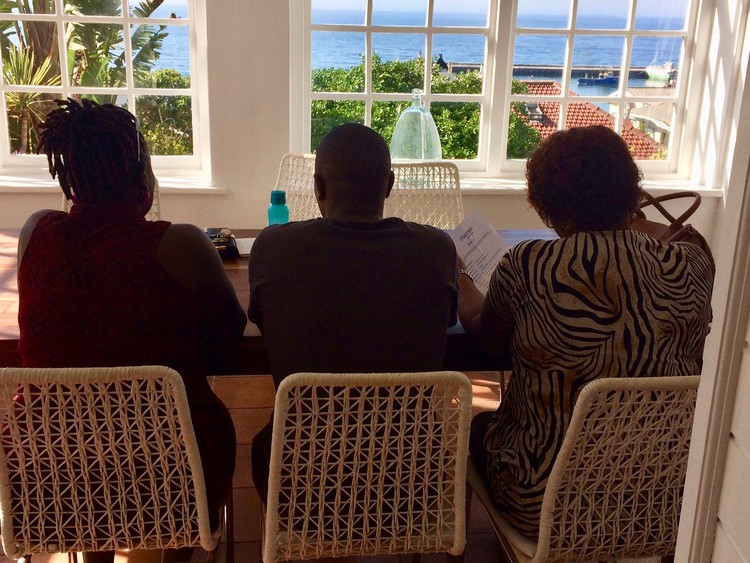Nairobi sex workers want a research code of conduct
They have been inspired by example of South African San groups
Nairobi sex workers, who made headlines in the early 1990s when researchers announced that a small group appeared to be immune to HIV, want to establish a code of conduct for researchers in an attempt to get some benefit from the decades of studies they have taken part in.
They also want some sort of “meaningful involvement” in the research.
Their idea was born in Cape Town during a conference in March, when a group of Nairobi sex worker delegates watched three South African San groups launch a code of ethics for researchers, intended to encourage the kind of study that was to the mutual benefit of both the San and researchers.
One of the sex worker delegates, who wanted to be known only as Sophia, told GroundUp they had been interacting with the San and wanted to learn from them.
“We’re not far down the path yet. We’re also a vulnerable group like the San, but the difference is we are vulnerable by the nature of our jobs. Poverty led us to do this job, and the lack of education,” Sophia said.
For nearly 30 years sex workers from the slums of Majengo in Nairobi have taken part in international research projects where scientists have tried to pin down what it is that makes some of them resistant to HIV – and figure out whether their resistance could hold a key to an Aids vaccine.
Although participation is voluntary, and all sign consent forms, some sex workers feel there is not much in it for them.
Some of the original group of sex workers who were studied first in the mid-1980s are now grandmothers, and some have daughters and even granddaughters in the trade who are now being studied. While the research has attracted millions of dollars in funding over the decades, nothing much has changed for the sex workers.
“Some of them say: ‘You found me in the slums selling sex, and now my child and my child’s child is selling sex. After all this research we still remain the same’,” Sophia said.
A male sex worker, who wanted to be known as Jonathan, said one of several problems they had with the research was that the consent forms were difficult to understand.
“So you sign contracts you don’t understand. Then maybe they give you drugs that make you drowsy or dizzy, but you didn’t know this,” he said.
Sophia said some researchers “change the goalposts”.
“They say if we find you have fibroids [a common tumour of the female reproductive system] we will help you, so people volunteer, but once they discover there are these problems they say ‘no, that is beyond our research’.”
Some researchers ask her for help, such as “mobilise five or ten ladies and we will pay you”. After spending time doing this, she is given “a small token, maybe enough to find food to eat that day. But we are making their work easy”.
The Cape Town conference where Majengo sex workers and San representatives met was organised by TRUST, an international support network funded by the European Community’s Horizon 2020 programme, which works to foster fair research partnerships.
The sex workers say they are aware of the difficulties of trying to get a code of conduct established for a trade that is illegal.
Joshua Kimani, a medical doctor and researcher among the Majengo sex workers, who was at the Trust conference, said: “Regarding research, sex workers are fighting for meaningful involvement.”
It was tricky, as sex work was “illegal, criminalised and a taboo subject in Kenya”. Violence and abuse was common, but because their trade was illegal, they had no recourse.
In a follow-up interview, Kimani said on Wednesday that since their return to Kenya, the sex workers had discussed the issue of a code with the Kenya Sex Workers Alliance.
“The visit to South Africa and the interaction with the San community opened their eyes to the many possibilities. But it will take some years before they can pull off a code of conduct. It will require a bit of muscle and funding from a dedicated source. The reaction to the San code by the world community gave our sex workers courage to think about it seriously,” Kimani said.
He said the average national HIV prevalence in Kenya was 6%, while 28% of Kenyan sex workers were HIV-positive. The focus of most of the Kenyan sex worker research was on the 3% who did not get HIV, despite multiple partners and often unprotected sex.
“Some just don’t get HIV. We’re still fishing to see what is going on.”
Asked to comment, Professor Francois Venter of the Wits Reproductive Health and HIV Institute said the idea of a code was “ground-breaking”, but warned it was a complex area.
“It is very positive, saying: ‘This is how we would like research to be done on us’, rather than having ethics committees making decisions on their behalf. It would be interesting to see what they say should and should not be done from both sides.
“But researchers are not there to solve their problems, or to build capacity. That is a government responsibility. They need some sort of happy medium,” Venter said.
Support independent journalism
Donate using Payfast

Don't miss out on the latest news
We respect your privacy, and promise we won't spam you.
Next: Fewer babies born with HIV in South Africa
Previous: SASSA debacle: Dlamini knew all along, says Magwaza
© 2017 GroundUp. 
This article is licensed under a Creative Commons Attribution-NoDerivatives 4.0 International License.
You may republish this article, so long as you credit the authors and GroundUp, and do not change the text. Please include a link back to the original article.

